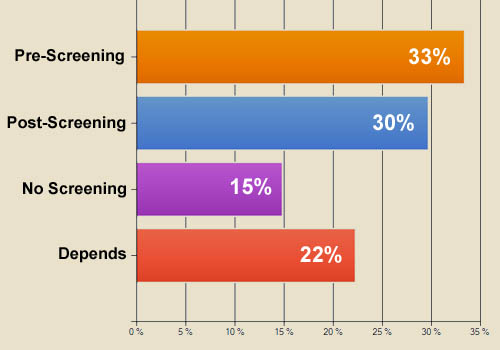New Media Privacy Issues & Online Health Marketing Survey
(Survey started 30 November 2010; N=41 respondents as of 5 February 2012)
 According to a Center for Digital Democracy (CDD) Press Release (see resource list):
According to a Center for Digital Democracy (CDD) Press Release (see resource list):
In a complaint filed on November 23, 2010, with the Federal Trade Commission, the Center for Digital Democracy, U.S. PIRG, Consumer Watchdog, and the World Privacy Forum called on the commission to investigate unfair and deceptive advertising practices that consumers face as they seek health information and services online. Consumers now confront a sophisticated and largely stealth interactive medical marketing apparatus that has unleashed an arsenal of techniques designed to promote the use of specific brand drugs and influence consumers about treatments for health conditions.
The CDD brief cites several companies and websites and calls for the FTC to investigate what it says are “unfair and deceptive” data collection practices of these companies.
Please take a few minutes to tell us YOUR opinion about the privacy issues raised in the CDD brief. We especially want to hear from companies that have been cited in the brief. Take the survey here
Partial results are summarized in charts below. You can view a more detailed, complete and up-to-date online Summary of Responses plus view comments from respondents after taking the survey yourself: here.
Type of Moderation
Q: “Please indicate your level of agreement or disagreement with the following accusations/statements made in the CDD brief regarding online health sites and consumer privacy.” Choice of responses: Strongly DISAGREE, Somewhat DISAGREE, Somewhat AGREE, Strongly AGREE, No Opinion. Statements:
- Little information is currently provided on what is being collected from users of health-related sites and how such data are used.
- The emergence of powerful new digital marketing techniques designed to influence consumer behavior around health conditions and medications requires a new approach to informing and protecting the public.
- Data collected via e-detailing and related methods also pose privacy concerns.
- The use of non-transparent, unaccountable, and unfair and deceptive marketing practices significantly adds to the financial and personal burden of consumers.
- “Direct-to-Consumer Digital Marketing” of pharmaceutical and health-related products requires the FTC to develop safeguards for sensitive-data-related advertising practices, and also ensure that interactive ad techniques are truthful and non-misleading.
- Digital marketing raises many distinct consumer protection and privacy issues, including an overall lack of transparency, accountability and personal control, which consumers should have over data collection and the various interactive applications used to track, target, and influence them online (including on mobile devices).
- Health consumers are being told that by using digital media services they have become empowered “E-patients,” but they are not being informed about the privacy and potential health risks connected with the use of digital marketing of pharmaceuticals and health products.
- Online marketing poses fundamental new risks to consumers of health information and services, given its powerful data collection and targeting capabilities.
- Online behavioral targeting is a threat to consumer privacy.
- Digital health marketing poses risks in terms of misinformation and the encouragement of consumers to seek out drugs and treatment whether they require them or not.
- Online marketing practices involving youth health concerns require special safeguards and immediate attention from the FTC.
- U.S. health consumers should not be subjected to hidden digital marketing techniques designed to amass detailed profiles of their behavior and then target them with ads for specific drugs and treatments.
- The growth of federal and private programs promoting personal electronic health records, such as the initiatives by Google and Microsoft, and their relationship to online health marketing and advertising tactics require FTC analysis and appropriate action.
- The FDA does not have the expertise and staffing to adequately protect the public from unfair and deceptive online practices.
Results to date are shown below. What’s your view? Take the survey and tell us (you can view up-to-date survey results plus comments after taking the survey here).

What’s your view? Take the survey and tell us (you can view up-to-date survey results plus comments after taking the survey here).




![6 Digital Tools at the Center of Healthcare Digitalization [INFOGRAPHIC]](http://ec2-54-175-84-28.compute-1.amazonaws.com/pharma-mkting.com/wp-content/uploads/2021/04/6DigitalTools_600px-100x70.jpg)




